Teacher Profile: Learning From Feedback Transcript
+++ 00:00:00 +++
Card:
Deeper Learning
Anna Tabor:
a teacher profile
Anna Tabor: If we're comparing the two teams I would actually say score wise throughout the game you noticed what if you were looking at the score, Caitlin [ph?]?
Caitlin: They were tying throughout the game.
Anna Tabor: Yeah, they were really tied throughout the game. Having the two overtimes mean that they ended twice and both teams were tied.
Lower Third:
Anna Tabor
8th Grade Math Teacher
Bronx Latin, Bronx New York
+++ 00:00:25 +++
Anna Tabor: I'm Anna Tabor. I teach eighth grade math and eighth grade advanced algebra and I teach in the South Bronx.
Anna Tabor: If I was to ask you who is a better team let's try to compare Golden State versus the Spurs. Who is the better team according to this graph? Just by the way it would look you would say what?
Students: Golden State.
Anna Tabor: Golden State but again that's not getting if we want to compare significantly our points per season are 109 and theirs are 110. Is that a really significant difference?
Students: No.
Anna Tabor: No. So one of the things that I'm going to have you guys do is actually look at data today and make comparisons.
+++ 00:01:00 +++
Anna Tabor: This is my fifth year teaching. I've been teaching algebra for a long time. I feel like there's been a high emphasis on testing and getting good test results and I've always had good test results with my children, but I don't feel like they've actually had a deeper understanding of the math.
Anna Tabor: I'm going to give you guys 20 minutes to make both histograms to compare the data for both teams before we come together and talk about this. Does everyone understand?
Students: Yes.
Anna Tabor: Yes, okay. You guys may begin.
+++ 00:01:26 +++
Anna Tabor: This year has been a completely different window than I've ever had into my classroom. Having a Math Instructional Specialist in my room who is coming in once a week and giving me constant feedback, she's really helped me grow. She's really focusing on the math and she really tries to get in with the students to see are they understanding or not?
Xiomara Gonzalez: What's this corner right here?
Student: Zero.
Xiomara Gonzalez: Uh-huh. So why does it start small three?
Student: Yeah doesn't make sense.
+++ 00:01:51 +++
Anna Tabor: She's really pushed me and challenged me to become even better.
Anna Tabor: These actually look very the same to me because if I was looking at this I was like oh look, they're both the same here, they're both the same here.
Student: Oh because by accident I put a lightening [ph?] and then I remember I had a zero and then I tried to erase it.
Lower Third:
Anna's Coaching Session
Xiomara Gonzalez: I'm just going to ask you a few questions today to help you in planning for your lesson and then we're just going to talk a little bit about the goals we've been working on and how you might want incorporate some of the stuff that came out of our inquiry team meeting into your classroom today.
Lower Third:
Xiomara Gonzalez
Math Coach
New Visions for Public Schools
+++ 00:02:17 +++
Xiomara Gonzalez: At the core of it, I'm facilitating looking at student work and making sense of it, and then ensuring that there is some follow up. It's always really about anticipating or analyzing student work and making some concrete decisions around that, and then seeing how are we going to measure that growth.
Anna Tabor: So the objective is that students will be able to analyze what may make a graph misleading, so that's the issues with scale, interval, frequency, not appropriately labeling.
Russell West: The first function of a coach is to make the team player better.
Lower Third:
Russell West
Lead Instructional Coach
New Visions for Public Schools
+++ 00:02:47 +++
Russell West: So our coaches are coming in and bringing their own experience from the classroom and their own experience of how to use performance-based assessment tools and that's new for most of the teachers we're working with.
Xiomara Gonzalez: Where do you anticipate students are going to be really successful because they've already been successful in something maybe that's happening, or you know your students and you know that this is going to go fine and where do you anticipate the struggle? And I'm asking because you kind of said "I don't know if I want to direct them with what data to look at."
+++ 00:03:16 +++
Anna Tabor: The biggest struggle I can see is looking at what the appropriate intervals are going to be.
Russell West: More importantly, the coach is coming in to support a team.
Lower Third:
Teacher Inquiry Session
Russell West: So our coach is coming and sitting down literally with a couple of teachers and talking about the work that's in front of the teachers.
Xiomara Gonzalez: You already kind of have your activity set up.
Anna Tabor: Uh-huh.
Xiomara Gonzalez: So highlighting things like scale.
Anna Tabor: Maybe we can work on, right.
Xiomara Gonzalez: Having them analyze interval.
Anna Tabor: Yeah.
+++ 00:03:44 +++
Anna Tabor: During our inquiry session I knew that I was going to continue teaching the same topic so when we were looking at the histograms and I was looking at some of the mistakes that the students were making and some of the misconceptions they had, I knew that that needed to be addressed at the beginning of the lesson before we could continue doing anything else.
Xiomara Gonzalez: Is there a way to kind of before class begins or at the beginning of class kind of go through maybe an activity like what Emily articulated where it's like okay so you're 12 months of the year, like how do we split that data up?
Lower Third:
Ron Chaluisan
Vice President
New Visions for Public Schools
+++ 00:04:11 +++
Ron Chalusian: What we're trying to really do is think about teaching now much more in the planning stages, so that teachers coming together, working together, asking each other questions, really trying to take their area of expertise and push each other to create situations for students.
Anna Tabor: Find the median of what?
Student: Oh the numbers under the median. Ah, I'm so smart!
+++ 00:04:41 +++
Xiomara Gonzalez: Anna got a chance to really uncover what the problems were. That's the power of having another person in the classroom and having an inquiry team to look at this work. She used that data to make informed decisions about what was going on in the class and when all of her students started working there were much fewer mistakes there than what she had initially highlighted and those kids were actually connecting the dots.
Student: As you can see the two histographs I did were about the R.P.G. or rebound made by the Nicks and Pacers based on the information shown in each graph. I think the Nicks are better with rebounds than the Pacers.
+++ 00:05:17 +++
Anna Tabor: I want you to notice again that he kept the intervals the same which is what you need to do to be able to compare your data.
Lower third:
Chris
8th Grade Student
Bronx Latin, Bronx New York
Chris: I don't know I never really saw math was that interesting until now. She puts a lot of her personal life into in the sense of life stories that have to do with the questions we're being asked in the work and stuff.
Chris: It makes it feel more I don't know how to- interesting.
Chris: The Nicks have more rebounds and a higher interval and higher intervals than the Pacers do so that's like another example of why the Nicks are better.
+++ 00:05:50 +++
Anna Tabor: I mean it's changed me as a teacher. It's made me a lot more thoughtful and deliberate. Being able to work with other teachers, bounce off other ideas, it's just really helped me figure out how to actually get more in depth and to get the kids to understand this course. So for me it's been really transformative the way that I teach.
Students:
Anna Tabor: Okay.
#### End of anna_tabor_profile

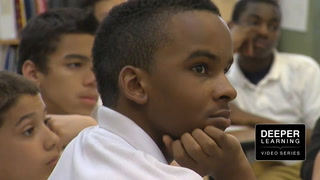
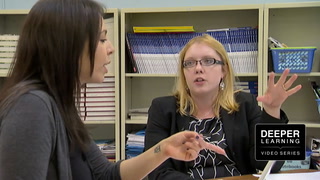
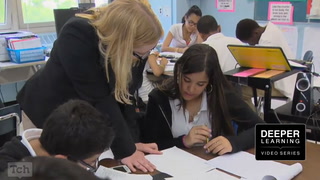
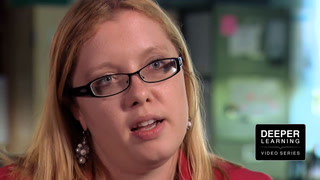
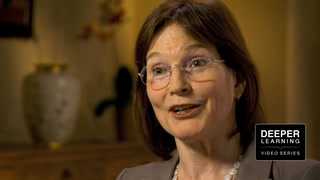








3 Comments
Elizabeth Owonikoko Jul 7, 2020 5:51pm
The most important work of a coach is to make the team player better. The coach is coming in to support the team, especially at the planning stage to find out how the coach can help the teacher to create a situation that would inform meaningful learning that would be engaging to the student and make them go more in-depth. The coach is to challenge your thoughts by talking with other teachers, sharing ideas that would make you better through their own classroom experiences.
Marc Soltis May 6, 2020 3:53pm
Feedback can be difficult to take. Ms. Tabors is obviously skilled and experienced but it is her growth mindset that allows her to take critical advice from another. The best performers, in any field, share this valuable trait.
The administration's role in this video and any other professional growth endeavors is to provide an environment where the teacher sees value and incentive to seek feedback. It seems like they care about the student's growth along with the teachers.
Sarah Neff Dec 7, 2017 11:26am